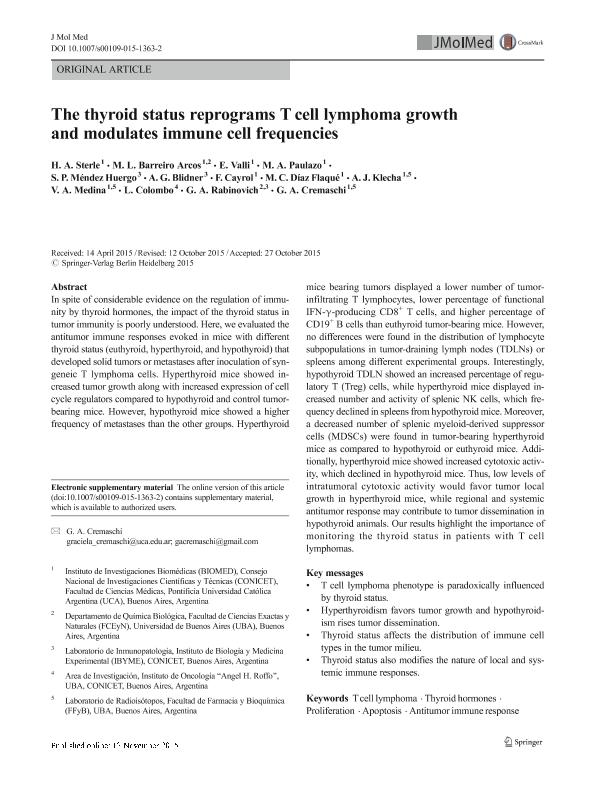Artículo
The thyroid status reprograms T cell lymphoma growth and modulates immune cell frequencies
Sterle, Helena Andrea ; Barreiro Arcos, María Laura
; Barreiro Arcos, María Laura ; Valli, Eduardo
; Valli, Eduardo ; Paulazo, Maria Alejandra
; Paulazo, Maria Alejandra ; Mendez Huergo, Santiago Patricio
; Mendez Huergo, Santiago Patricio ; Blidner, Ada Gabriela
; Blidner, Ada Gabriela ; Cayrol, Maria Florencia
; Cayrol, Maria Florencia ; Díaz Flaqué, María Celeste
; Díaz Flaqué, María Celeste ; Klecha, Alicia Juana
; Klecha, Alicia Juana ; Medina, Vanina Araceli
; Medina, Vanina Araceli ; Colombo, Lucas Luis
; Colombo, Lucas Luis ; Rabinovich, Gabriel Adrián
; Rabinovich, Gabriel Adrián ; Cremaschi, Graciela Alicia
; Cremaschi, Graciela Alicia
 ; Barreiro Arcos, María Laura
; Barreiro Arcos, María Laura ; Valli, Eduardo
; Valli, Eduardo ; Paulazo, Maria Alejandra
; Paulazo, Maria Alejandra ; Mendez Huergo, Santiago Patricio
; Mendez Huergo, Santiago Patricio ; Blidner, Ada Gabriela
; Blidner, Ada Gabriela ; Cayrol, Maria Florencia
; Cayrol, Maria Florencia ; Díaz Flaqué, María Celeste
; Díaz Flaqué, María Celeste ; Klecha, Alicia Juana
; Klecha, Alicia Juana ; Medina, Vanina Araceli
; Medina, Vanina Araceli ; Colombo, Lucas Luis
; Colombo, Lucas Luis ; Rabinovich, Gabriel Adrián
; Rabinovich, Gabriel Adrián ; Cremaschi, Graciela Alicia
; Cremaschi, Graciela Alicia
Fecha de publicación:
04/2016
Editorial:
Springer
Revista:
Journal of Molecular Medicine (Berlin, Germany)
ISSN:
0946-2716
Idioma:
Inglés
Tipo de recurso:
Artículo publicado
Clasificación temática:
Resumen
In spite of considerable evidence on the regulation of immunity by thyroid hormones, the impact of the thyroid status in tumor immunity is poorly understood. Here, we evaluated the antitumor immune responses evoked in mice with different thyroid status (euthyroid, hyperthyroid, and hypothyroid) that developed solid tumors or metastases after inoculation of syngeneic T lymphoma cells. Hyperthyroid mice showed increased tumor growth along with increased expression of cell cycle regulators compared to hypothyroid and control tumor-bearing mice. However, hypothyroid mice showed a higher frequency of metastases than the other groups. Hyperthyroid mice bearing tumors displayed a lower number of tumor-infiltrating T lymphocytes, lower percentage of functional IFN-γ-producing CD8+ T cells, and higher percentage of CD19+ B cells than euthyroid tumor-bearing mice. However, no differences were found in the distribution of lymphocyte subpopulations in tumor-draining lymph nodes (TDLNs) or spleens among different experimental groups. Interestingly, hypothyroid TDLN showed an increased percentage of regulatory T (Treg) cells, while hyperthyroid mice displayed increased number and activity of splenic NK cells, which frequency declined in spleens from hypothyroid mice. Moreover, a decreased number of splenic myeloid-derived suppressor cells (MDSCs) were found in tumor-bearing hyperthyroid mice as compared to hypothyroid or euthyroid mice. Additionally, hyperthyroid mice showed increased cytotoxic activity, which declined in hypothyroid mice. Thus, low levels of intratumoral cytotoxic activity would favor tumor local growth in hyperthyroid mice, while regional and systemic antitumor response may contribute to tumor dissemination in hypothyroid animals. Our results highlight the importance of monitoring the thyroid status in patients with T cell lymphomas.
Archivos asociados
Licencia
Identificadores
Colecciones
Articulos(BIOMED)
Articulos de INSTITUTO DE INVESTIGACIONES BIOMEDICAS
Articulos de INSTITUTO DE INVESTIGACIONES BIOMEDICAS
Articulos(IBYME)
Articulos de INST.DE BIOLOGIA Y MEDICINA EXPERIMENTAL (I)
Articulos de INST.DE BIOLOGIA Y MEDICINA EXPERIMENTAL (I)
Articulos(OCA HOUSSAY)
Articulos de OFICINA DE COORDINACION ADMINISTRATIVA HOUSSAY
Articulos de OFICINA DE COORDINACION ADMINISTRATIVA HOUSSAY
Citación
Sterle, Helena Andrea; Barreiro Arcos, María Laura; Valli, Eduardo; Paulazo, Maria Alejandra; Mendez Huergo, Santiago Patricio; et al.; The thyroid status reprograms T cell lymphoma growth and modulates immune cell frequencies; Springer; Journal of Molecular Medicine (Berlin, Germany); 94; 4; 4-2016; 417-429
Compartir
Altmétricas



